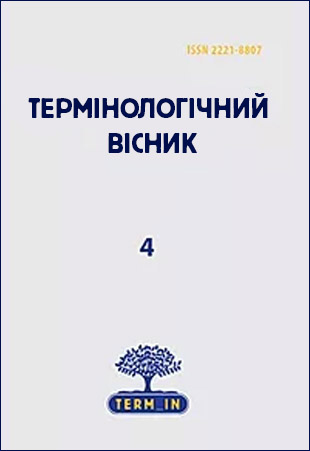The correlation between the thematic group of terms and the documents in the bibliographic database iSybislaw: on the problem of search results relevance

Founders
National Academy of Sciences of Ukraine,
Institute of Ukrainian Language of NAS
Publisher
Institute of the Ukrainian Language of National Academy of Sciences of Ukraine
Scientific journal Ukrainian Language is registered by the Ministry of Justice of Ukraine as print media (Certificate: Series КВ № 12180 – 1064 ПР of January 12, 2007).
Included in the list of printed scientific specialized editions of Ukraine (Order of MES of Ukraine no528 from 12.05.2015)
Back side of the journal
Yevgeniya Volkova
Information about the author: Research Center for Belarusian Culture, Language and Literature of the National Academy of Sciences of Belarus, Researcher
e-mail: volkava@gmail.com
Title: The Correlation Between the Thematic Group of Terms and the Documents in the Bibliographic Database iSybislaw: On the Problem of Relevance of Search Results
Rubric: Terminography and Practice of Compiling Branch Dictionaries
Abstract: The article deals with the bibliographic database of Slavic linguistics iSybislaw, its search tools and the features which they provide to the user, some problems the user may encounter are being investigated. In addition, the possibilities of using logical operators AND, OR, NOT are shown, and recommendations for the compilation of search expressions are given.
The data in the iSybislaw database has a linear structure. For example, the general concept of text and the narrower notion of scientific text in the index of keywords hold an equal position. The user cannot navigate through hierarchical levels (for example, text ↔ written text ↔ scientific text) to narrow or expand the search. The user must accurately determine the properties that the desired object must possess in advance, and it is also worthwhile to note the properties that the object should not possess. For example, the user is interested in papers which study the linguistic features of scientific texts. We exclude terminology from our search query. Although, it is an integral part of a scientific text, in this case it does not interest us as an immediate object of research. The search query can look like this: naukowy AND (styl OR tekst OR dyskurs OR język) NOT termin.
A set of keywords for each document has a linear structure too. In the bibliographic records keywords are arranged alphabetically. This does not always allow to determine accurately the relevance of the document for the user’s tasks.
Since the search in the database can be carried out in different languages (in the future – in all Slavic languages), the article demonstrates that the language of searching can influence the structure of the search expression and the search results. The results of applying the search expression in Polish and Russian are compared. It was found that differences in the grammatical systems of the Slavic languages make it difficult to create identical search expressions with identical results.
The number of documents in the database and the list of keywords is constantly growing, and, accordingly, the conditions for finding the necessary information become more complicated. Therefore, it is very important to develop and offer users methods of search optimization to obtain the necessary information.
Keywords: iSybislaw, logical operator, thematic group, keyword, search expression, relevance
References:
- Ostapczuk, (2007). Język informacyjno-wyszukiwawczy i problem ekwiwalencji słów kluczowych językoznawstwa slawistycznego. Zagadnienia Informacji Naukowej, 2, 54–63 (in Pol.).
- Papcunová, (2007). Opracowanie bibliografii czeskiego językoznawstwa: przeszłość i teraźniejszość. Zagadnienia Informacji Naukowej, 2, 64–68 (in Pol.).
- Rudnik-Karwatowa, Zofia, Banasiak, Jakub & Mikos, Zenon. (2013). Językowe problemy optymalizacji wyszukiwania informacji w systemie iSybislaw Slavia Orientalis. Vol. 62, 4, 631–646 (in Pol.).
- Bibliograficzna baza danych światowego językoznawstwa slawistycznego iSybislaw. Retrieved from: http: //www.isybislaw.ispan.waw.pl/
- Fastyn,M. (2014). iSybislaw sprzymierzeńcem studentów, doktorantów oraz pracowników naukowych Adeptus, 4, 104–109 (in Pol.).


